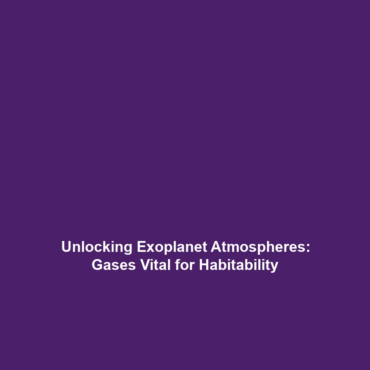Atmospheric Composition of Exoplanets: Key Determinants for Habitability
The study of atmospheric composition in exoplanets has become a pivotal focus within the field of exoplanet research. Understanding the various gases that comprise an exoplanet’s atmosphere not only helps scientists gauge the potential for habitability but also unveils the complexities of planetary systems beyond our solar system. This article delves into how researchers determine the atmospheric makeup of exoplanets and identifies the gases essential for supporting life, offering critical insights into space exploration and astrobiology.
Key Concepts
To appreciate the atmospheric composition of exoplanets and its implications for habitability, it is vital to consider several key concepts:
- Spectroscopy: This technique involves analyzing light from an exoplanet’s atmosphere, allowing scientists to identify the presence of various gases based on their unique spectral signatures.
- Transit Method: Using this method, astronomers can observe a star’s light dimming as a planet transits in front of it, providing data on the exoplanet’s size and atmospheric details.
- Critical Gases for Habitability: Oxygen (O2), carbon dioxide (CO2), methane (CH4), and water vapor (H2O) are among the primary gases being studied, as their presence indicates potential biological activity.
Applications and Real-World Uses
Understanding the atmospheric composition of exoplanets has significant applications:
- Assessing Habitability: By determining which gases are present, scientists can evaluate whether an exoplanet falls within the Goldilocks zone, where conditions might support life.
- Planetary Climate Models: Atmospheric studies contribute to models predicting the climate and weather patterns of exoplanets, useful for future exploration missions.
- Astrobiological Research: Insights gained from these studies directly impact the search for extraterrestrial life forms and the fundamental understanding of life’s potential evolution elsewhere in the universe.
Current Challenges
Despite advancements in exoplanetary studies, several challenges remain:
- Limited Data: Many exoplanets are far from Earth, making detailed observations and data collection difficult.
- Atmospheric Escape: Some exoplanets may have lost their atmospheres, complicating our understanding of their potential for supporting life.
- Technological Limitations: Current instruments may not yet be capable of detecting trace gases or analyzing atmospheres of smaller, Earth-like exoplanets.
Future Research and Innovations
As technology progresses, the future of atmospheric composition research promises exciting developments:
- Next-Generation Telescopes: Advancements in telescope technology, such as the James Webb Space Telescope (JWST), will enhance our ability to observe exoplanets and their atmospheres.
- Artificial Intelligence: AI algorithms are being developed to analyze vast amounts of data quickly, improving the accuracy of identifying atmospheric components.
- In-Situ Measurements: Future missions may include probes capable of taking direct measurements of an exoplanet’s atmosphere, providing definitive answers about habitability.
Conclusion
In summary, understanding the atmospheric composition of exoplanets is crucial for the ongoing search for habitable worlds beyond Earth. By employing advanced techniques like spectroscopy and transit observations, scientists can discern the gases that might indicate life-supporting environments. As we look to the future, ongoing research and technological innovations will continue to pave the way for deeper explorations of exoplanets, fostering a greater understanding of our universe. To dive deeper into related topics, consider exploring the ongoing search for exoplanets or the field of astrobiology.
